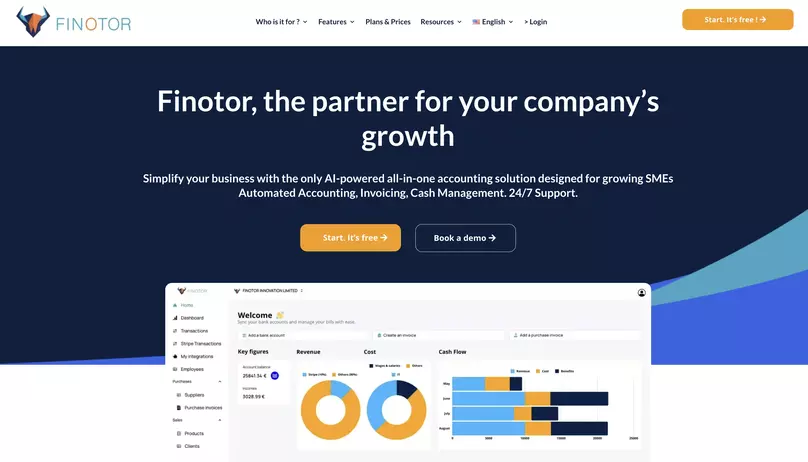Contents
- 1 Why Explore Global Financing Options?
- 2 Understanding Small Business Loans
- 3 What is a Small Business Loan?
- 4 How the Small Business Administration (SBA) Helps
- 5 Types of Loans for Small Business Financing Abroad
- 6 Export Loans
- 7 Working Capital Loans
- 8 Equipment Financing Loans
- 9 Term Loans
- 10 Trade Finance Loans
- 11 Microloans
- 12 Foreign Currency Loans
- 13 Development Loans, Grants, and SBA Guaranteed Loans
- 14 Line of Credit
- 15 Key Factors to Consider When Seeking International Financing: Business Credit Scores
- 16 Partnering with Finotor for International Success
- 17 Conclusion
Types of Loans for Small Businesses Abroad: USA Businesses
In today’s increasingly interconnected world, small businesses in the United States are expanding their horizons beyond domestic borders. Whether it’s establishing an overseas presence, importing raw materials, or exporting goods, global opportunities are abundant. However, taking advantage of these opportunities often requires capital. For small businesses, understanding the types of loans available for international ventures is essential.
Annual revenue plays a crucial role in determining loan eligibility and financial health for businesses venturing abroad.
This comprehensive guide explores the various financing options available for small businesses venturing abroad. We’ll discuss the different types of loans, their benefits, and how they can help businesses thrive in international markets. At the same time, we’ll highlight how Finotor, an all-in-one AI-driven accounting and finance solution for small businesses, can help you navigate the complexities of global financing and streamline your financial operations.
Why Explore Global Financing Options?
Operating internationally offers countless opportunities for growth. From reaching new markets to diversifying revenue streams, expanding abroad can transform a small business. However, these ventures also come with unique challenges—chief among them is securing sufficient funding. Securing funding not only helps grow one’s own business but also contributes to the broader ecosystem of small business owners.
Global financing provides the capital needed to:
- Launch or expand overseas operations, such as opening a branch office in Canada or Europe.
- Purchase equipment or inventory from international suppliers like those in Mexico or China.
- Hire local staff or train employees to operate efficiently in markets like Brazil or the UK.
- Navigate regulatory and compliance requirements in countries with strict import-export laws like Germany or Japan.
Understanding the types of loans available ensures that businesses can make informed decisions to support their international ambitions. With Finotor’s AI-powered solutions, small businesses can analyze financing options, manage cash flow, and stay compliant with international financial regulations, allowing them to focus on seizing opportunities abroad. It is also relevant to mention that if you or your business peers are interested in improving your accounting and bookkeeping management, we can offer Finotor to you at a discount through Finotor’s affiliate program.
Understanding Small Business Loans
In the dynamic world of small business, securing the right type of financing is crucial for growth and sustainability. Small business loans are designed to provide the necessary capital for various business needs, from purchasing inventory and investing in new equipment to expanding operations and covering emergency expenses. These loans are offered by a range of lenders, including traditional banks, credit unions, online lenders, and government agencies, each with its own set of terms and conditions.
What is a Small Business Loan?
A small business loan is a financial product specifically tailored to meet the needs of small businesses. These loans can be used for a multitude of purposes, such as buying inventory, upgrading equipment, expanding facilities, or managing unexpected costs. Small business loans are available from a variety of sources, including traditional banks, credit unions, online lenders, and government agencies. Each lender offers different terms, interest rates, and repayment schedules, allowing businesses to choose the option that best fits their needs.
How the Small Business Administration (SBA) Helps
The Small Business Administration (SBA) plays a pivotal role in supporting small businesses by setting guidelines for loans and reducing the risk for lenders. SBA-backed loans are designed to make it easier for small businesses to access the funding they need. These loans come with favorable terms and lower interest rates, making them an attractive option for many small businesses. The SBA offers various loan programs, each tailored to different business needs, ensuring that small businesses have access to the capital required for growth and success.
Types of Loans for Small Business Financing Abroad
Export Loans
Export loans are designed specifically to support businesses that sell goods or services internationally. These loans are particularly beneficial for small businesses that need short-term funding to fulfill export contracts.
Features of Export Loans:
- Short-term financing: Typically ranges from 30 days to a year.
- Flexibility: Can cover production costs, shipping expenses, and even marketing efforts for markets like the EU or Asia.
- Trade credit: Some lenders offer trade credit to help businesses manage cash flow while awaiting payment from foreign buyers in regions such as South America.
U.S. Options: The U.S. Small Business Administration (SBA) offers export-specific loans, such as the Export Express Loan, which provides up to $500,000 for export-related expenses. Similarly, the Export-Import Bank of the United States (EXIM Bank) provides working capital guarantees to encourage exports.
With Finotor, businesses can streamline loan management and track export-related cash flows in real-time, ensuring every dollar works efficiently.
Working Capital Loans
Working capital loans are ideal for maintaining daily operations during international expansion. These loans help businesses manage their cash flow while meeting short-term obligations such as payroll, rent, and utilities. Effective cash flow strategies are crucial for ensuring smooth daily operations and financial stability during this period.
Features of Working Capital Loans:
- Unrestricted use: Funds can be used for a wide range of business expenses, like maintaining a supply chain involving suppliers in Mexico or India.
- Quick disbursement: Loans are often processed faster than other financing options, making them ideal for businesses responding to sudden demand in markets like Australia.
- Repayment flexibility: Terms typically range from six months to three years.
How Finotor Helps: Finotor’s AI-driven tools can track repayment schedules, help businesses compare interest rates, and provide insights into cash flow trends, ensuring businesses maximize the benefits of working capital loans.
Equipment Financing Loans
Expanding abroad often requires purchasing new equipment or upgrading existing infrastructure. Funding is also needed to purchase commercial real estate for expanding abroad. Equipment financing loans are tailored for these purposes.
Features of Equipment Financing Loans:
- Secured loans: The purchased equipment often serves as collateral.
- Competitive rates: Interest rates are generally lower than unsecured loans.
- Flexible terms: Repayment periods can range from a few years to the equipment’s useful life.
By leveraging Finotor’s accounting solutions, businesses can track the ROI of their equipment investments and ensure their cash flow remains stable.
Term Loans
Term loans provide businesses with a lump sum that is repaid over a fixed period. These loans are versatile and can be used for various international needs, such as expanding facilities or acquiring inventory.
Having a bank account is crucial when applying for term loans, as an established relationship with a bank can improve approval chances. Before you continue, don’t forget to also learn about why small business loans are so hard to get? here. You’ll learn about the barriers to prepare for and the tips to overcome them.
Features of Term Loans:
- Predictable payments: Fixed monthly payments make budgeting easier.
- Customizable terms: Loan amounts and repayment periods can be tailored to the borrower’s needs.
- Long-term financing: Ideal for substantial investments with a longer ROI timeline.
Finotor’s Advantage: With Finotor, businesses can efficiently track loan utilization, automate repayments, and generate detailed financial reports for lenders, ensuring transparency and better financial management.
Trade Finance Loans
Trade finance loans facilitate international trade transactions by providing funding to cover the costs of importing or exporting goods. These loans are essential for businesses dealing with foreign suppliers or buyers.
SBA-backed loans guaranteed offer flexibility for various business purposes, ranging from small to large amounts. It is important to verify usage restrictions with an SBA-approved lender to ensure the loan aligns with specific business needs.
Types of Trade Finance Loans:
- Letters of credit: Ensures payment to suppliers upon fulfilling contractual terms.
- Invoice financing: Allows businesses to receive advance payments on outstanding invoices.
- Supply chain financing: Optimizes cash flow by extending payment terms with suppliers.
Finotor’s Role: Finotor helps businesses monitor trade finance loan utilization, manage invoicing, and reconcile payments seamlessly across multiple currencies.
Microloans
For small businesses with modest financing needs, microloans are an excellent option. These loans are typically offered by nonprofit organizations, government agencies, or community development financial institutions (CDFIs).
Funds generated from repayments are reinvested to support other business owners, fostering a community of mutual assistance among entrepreneurs.
Features of Microloans:
- Small amounts: Typically capped at $50,000.
- Accessible: Easier approval process compared to traditional loans.
- Supportive: Often paired with technical assistance or mentorship programs.
How Finotor Can Help: Finotor’s user-friendly platform simplifies microloan tracking and integrates with budgeting tools to ensure businesses make the most of these small yet impactful funding options.
Foreign Currency Loans
Foreign currency loans are tailored for businesses operating in countries with different currencies. These loans allow businesses to borrow in the local currency of the target market, reducing currency exchange risks.
The importance of personal credit cannot be overstated when obtaining foreign currency loans for business purposes, as it influences eligibility and potential risks.
Benefits of Foreign Currency Loans:
- Currency stability: Protects against fluctuations in exchange rates.
- Improved creditworthiness: Demonstrates financial commitment to local markets.
- Localized terms: Lenders understand the regulatory environment of the target market.
Finotor’s Contribution: With Finotor, businesses can manage currency exchange risks effectively through automated tracking and reporting tools designed for global operations.
Development Loans, Grants, and SBA Guaranteed Loans
Development loans and grants are designed to support businesses that contribute to economic growth in developing countries. These financing options often come with favorable terms or no repayment requirements.
Small business financing plays a crucial role in promoting economic growth in developing countries by providing the necessary capital for small enterprises to thrive.
Sources of Development Loans:
- World Bank and IFC: Offer loans to businesses promoting sustainable development.
- USAID and other aid agencies: Provide grants for projects aligning with their development goals.
Finotor’s Support: Finotor’s tools can help businesses manage development funds responsibly by providing transparent reporting and compliance features tailored to international standards.
Line of Credit
A line of credit is a versatile type of small business loan that provides businesses with the flexibility to borrow and repay funds as needed. Unlike a traditional loan, which provides a lump sum of money, a line of credit offers a revolving credit facility. This means that businesses can access a predetermined amount of credit, use it to cover various expenses, and repay it over time, only to borrow again when needed.
Advantages of Line of Credit:
- Flexibility: A line of credit allows businesses to borrow and repay funds as needed, making it an ideal option for managing cash flow. This flexibility ensures that businesses have access to funds when they need them most.
- Convenience: With a line of credit, businesses can cover a wide range of expenses, such as purchasing inventory, paying bills, or handling emergency costs. This convenience makes it a valuable tool for day-to-day operations.
- Cost-effective: Interest on a line of credit is only charged on the amount borrowed, making it a cost-effective financing option. This can help businesses save money compared to other types of loans.
- Builds business credit: Responsibly using a line of credit can help businesses build their business credit scores. A strong credit score can make it easier to access additional credit in the future, further supporting business growth.
- Easy to manage: Modern banking solutions, including online and mobile banking apps, make it easy to manage a line of credit. Businesses can track borrowing and repayment, ensuring they stay on top of their finances.
By understanding small business loans and the options available, businesses can make informed decisions about their financing needs and choose the best option for their growth and success.
Key Factors to Consider When Seeking International Financing: Business Credit Scores
- Loan Requirements: Each loan type comes with specific eligibility criteria. Finotor’s AI-driven tools can simplify documentation preparation and ensure your business meets lender requirements. SBA loans, provided by the Small Business Administration, offer benefits such as easier qualification, longer loan terms, and lower down payments, making them an excellent option for securing international financing.
- Local Regulations: Navigating international regulations can be complex. Finotor’s expertise helps small businesses remain compliant and streamline regulatory processes in markets like Germany, India, or Japan.
- Currency Exchange Rates: Finotor helps businesses manage currency fluctuations through real-time exchange rate tracking and budgeting tools.
- Cultural and Economic Factors: Finotor’s insights into international markets ensure that your financial strategies align with local economic conditions and cultural nuances.
Partnering with Finotor for International Success
Navigating global financing options can be daunting, but businesses don’t have to do it alone. Finotor’s all-in-one AI-driven accounting and finance solution simplifies every aspect of international business finance. From identifying suitable loans to managing cash flow, compliance, and currency risks, Finotor equips small businesses with the tools they need to succeed in global markets. Again, if you or your business peers are interested in improving your accounting and bookkeeping management, we can offer Finotor to you at a discount through Finotor’s affiliate program.
Conclusion
Exploring financing options is a critical step for small businesses looking to grow internationally. From export loans and working capital solutions to microloans and foreign currency loans, the array of funding opportunities allows businesses to tailor their strategies to specific goals and challenges.
With Finotor by your side, navigating the complexities of international financing has never been easier. Empower your business with Finotor’s AI-driven tools and expertise to seize opportunities abroad and achieve lasting success.
FAQs Relating to Small Business Loans
1. What Types of Loans Are Available for Small Businesses Expanding Internationally?
Small businesses can explore various loans, including export loans, working capital loans, equipment financing, and foreign currency loans, to support global expansion.
2. How Do Export Loans Benefit Small Businesses Entering International Markets?
Export loans provide funding for production, shipping, and marketing expenses, helping businesses fulfill overseas contracts and expand globally.
3. What Is the Role of Working Capital Loans in International Business Growth?
Working capital loans ensure smooth operations by covering payroll, utilities, and supply chain costs during global expansion.
4. How Can Equipment Financing Loans Support Global Expansion?
These loans allow businesses to purchase or upgrade equipment needed for international operations, with competitive rates and flexible repayment terms.
5. Why Are Trade Finance Loans Essential for Importing and Exporting Goods?
Trade finance loans, including letters of credit and invoice financing, help businesses manage cash flow and secure transactions with foreign suppliers or buyers.
6. What Are Microloans, and How Can They Help Small Businesses?
Microloans provide up to $50,000 for small-scale international ventures, offering easier access and additional mentorship opportunities.
7. How Can Businesses Reduce Currency Exchange Risks with Foreign Currency Loans?
Foreign currency loans enable businesses to borrow in the local currency of their target market, minimizing exchange rate fluctuations.
8. What Financing Options Are Available for Sustainable Development Abroad?
Development loans and grants from organizations like the World Bank and USAID support businesses contributing to economic growth in developing regions.
9. How Does a Line of Credit Help Manage Cash Flow for International Businesses?
A line of credit offers flexible funding for covering expenses such as inventory, unexpected costs, or emergencies during global operations.
10. How Can Finotor Simplify International Loan Management for Small Businesses?
Finotor’s AI-powered tools streamline cash flow tracking, compliance, and loan utilization, ensuring businesses make informed financial decisions abroad.









